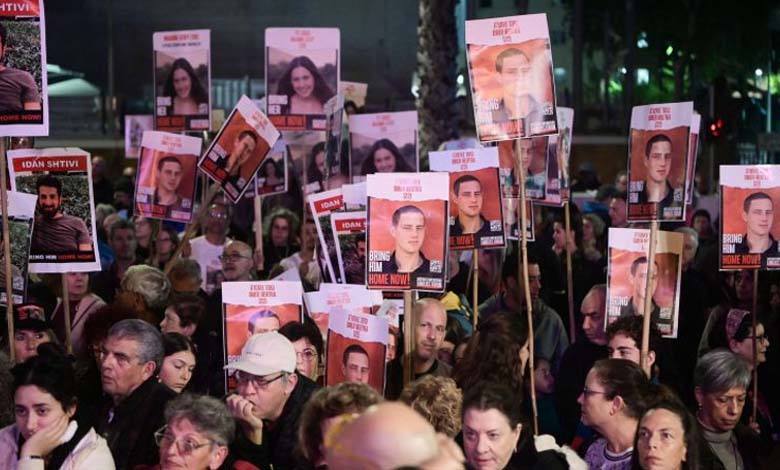Hostage Operations: How Does Israel Gather Intelligence in Gaza?

The recovery of the bodies of six hostages by Israel in the city of Khan Younis, in the southern Gaza Strip, has raised questions about how Israel gathers intelligence regarding hostages.
-
Washington denies using floating dock in rescue of Israeli hostages and announces completion of aid deliveries
-
Doha negotiates with Hamas to bring in medicines for Israeli hostages
The operation to recover the six bodies was partly successful due to intelligence gathered by the Israeli internal security agency, known as “Shin Bet.”
The Israeli army stated that its military engineering teams spent hours overnight digging through a 650-foot tunnel in Khan Younis to find the bodies of Israeli hostages kidnapped by Hamas on October 7. The recovery came after a Palestinian detainee in Israeli custody revealed the location of the bodies last month, bringing the total number of recovered hostages to 30.
-
7 Hostages Killed in Israeli Strike Disrupting Ceasefire Talks
-
Bodies of 6 hostages ignite criticism of Netanyahu: Found in Khan Younis
However, rescues of live hostages are extremely rare, as they require highly detailed intelligence, and much can go wrong, according to The Wall Street Journal.
Following the October 7 attack, Israel, with American assistance, boosted its signal intelligence capabilities, gathering information by tracking and analyzing electronic communications such as phone calls, emails, and other digital data.
-
Confessions of an Israeli Soldier: We Destroyed Homes in Gaza for “Trivial Reasons”
-
“Theft, Arson, and No Justification”.. Israeli Soldiers Refuse to Return to Gaza
Human intelligence collected from detained Palestinians in Gaza and others providing information to Israeli forces was also a key factor.
According to The Wall Street Journal, Karen Nahum, an intelligence expert from Reichman University in Israel, assembled a team of Israeli volunteers who scanned social media and developed algorithms to analyze 200,000 videos to identify missing persons. The team shared its findings with intelligence officials.
-
Hamas awaits Netanyahu’s response amid Israeli protester pressures
-
“Loophole” in Gaza ceasefire negotiations… Hamas condition clashes with Israeli wall
The Israeli army also established a special intelligence unit led by General Nitzan Alon, one of Israel’s negotiators in ceasefire talks, to collect and analyze information about the hostages and provide families with proof of life.
This unit facilitated the exchange of intelligence between different security agencies.
American Intelligence Assistance
Israel also received support from the U.S., which increased phone call interceptions in Gaza following the outbreak of the war, according to a recently retired U.S. intelligence officer. This helped Israel identify the location of hostages.
-
The Israeli Dilemma… Who Governs Gaza After the War?
-
Hamas Remaining in Power and Ceasefire Demand: Israeli Army’s Requests Anger Netanyahu
Former General Ziv said Israeli intelligence efforts improved because the ground operation in Gaza brought in data from mobile phones, computers, and documents found in the enclave. The invasion also allowed Israel to gather intelligence from Gaza residents or through prisoner interrogations.
Israel has faced accusations in recent months of “mistreating Palestinian detainees,” who are used by Tel Aviv to gather intelligence. This has sparked protests from international human rights organizations, claiming that prison conditions in Israel “amount to violations,” according to The Wall Street Journal.
-
A “Complex Operation”: How Israel rescued four hostages from central Gaza
-
Palestinian Prisoners in Israeli Jails… Gaza Raises the Number and Intensifies the Suffering
Israeli security officials, however, argue that human intelligence is essential for rescue operations, as it “provides highly accurate information.”
Israel has also expanded its use of artificial intelligence to help process and analyze the vast amounts of visual and signal intelligence coming from Gaza, as handling all this information manually would be impossible, according to informed sources.
Despite improvements, Israeli intelligence efforts still face challenges, as Hamas is careful to use communication methods that evade signal intelligence monitoring.
-
Israeli-Hamas Tensions Over U.S. Proposal for Hostage Deal
-
The United Nations Utilizes Israeli Military Route to Transport Aid into Gaza
Message-Only Communication
Hamas leader Yahya Sinwar has cut off communication with the movement’s leadership due to mistrust, believing there is a spy in their ranks after the assassination of Marwan Issa, deputy military commander of Hamas, last March, according to The Wall Street Journal.
Another obstacle Israel faces in rescuing hostages is that they are scattered across Gaza and frequently moved to make it harder to locate them.
-
Israeli massacre targets a crowd gathered around aid distribution
-
Progress in Hostage Release Talks Amid Israeli Escalation in Gaza
Former hostage Aviva Siegel told The Wall Street Journal that she was held in 13 different locations, both above and below ground, during her 51 days in Gaza.
Rescuing live hostages is a major challenge. Even recovering the bodies is no easy task, as they are hidden in places that complicate the mission.
Even when Israel has all the necessary intelligence, it does not always choose to carry out a rescue operation. The February operation in Rafah was ready well in advance but delayed in the hope of a negotiated release of the hostages.
-
A new Israeli road divides Gaza… A new stage of war or occupation on the horizon?
-
Hamas Seeks to Disrupt Israel by Announcing Increase in Hostages’ Deaths
Israeli officials debated whether it was worth risking the lives of two elderly hostages in a military operation, or waiting for a safer release in the ceasefire negotiations.
A former Israeli intelligence official stated, “Most hostages will only be returned through negotiations, as we need extremely detailed intelligence for this kind of operation, which is nearly impossible to gather. You can’t always know exactly where the hostage is, where the guards are, or the timing for action.”












